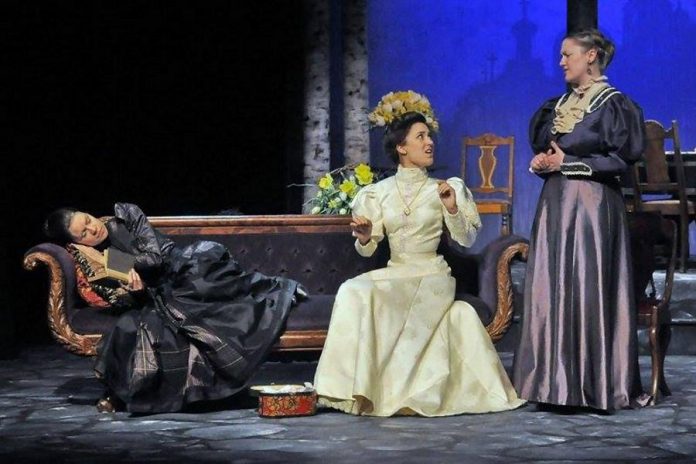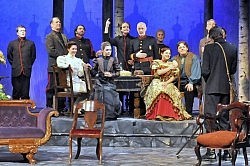
Although Russian playwright Anton Chekov based his 1901 play The Three Sisters on the lives of the Brontë Sisters, the themes of isolation and the many shades of grey of love are as relevant today as they were over a century ago.
With this in mind, director Jane Werger brings together a talented cast and crew of players together in a potent rendition of Chekov’s play at the Peterborough Theatre Guild.
While I’ve seen The Three Sisters on stage before, I’ve never really connected to the play. But Werger’s production is powerful as she brings out the passion, pain and — at times — comedy via a distinctly modern production filled with strong actors who bring their characters to life.
After a time, you don’t feel like you’re watching a stage production at all. It’s so alive that it could be happening in real life before your eyes. The result is an extremely emotional theatrical experience.
What makes Werger’s production of The Three Sisters so unique and enjoyable is the fact that she’s thrown out the usual pretentiousness associated with costume dramas, by eschewing such things as phony Russian accents and allowing her actors to play the parts like a modern drama set in another time — while staying true to the script at all times.
As a result, the audience is able to connect in an easier fashion to the players, extracting their own personal experiences and emotions from the various sub-plots. Not only can the audience relate to the characters, but members of the cast play their roles with such conviction that the audience believes in them. The onstage patter is fluid, making the drama seem natural and unscripted, which is a rare feat in a production of this sort.

Furthermore, the individual pairings of actors with one another results in dynamic drama. The passion between Kate Suhr in the role of Masha and Wyatt Lamoureux in the role of Vershinin is the strongest sub-plot and is played beautifully by both performers, culminating to the most powerful moments of the production in the final act. Suhr’s performance at the finale is gut-wrenchingly realistic and painful to watch.
Hannah Bailey, in the role of Irina, becomes the focal point of the production as a woman who is fighting off two suitors: Baron Tuzenbach (played by Matt Gilbert) and Captain Solyony (played by Matt Keast). A strange juxtaposition of romance occurs as it is the men who seem to believe in love, while Irina has no desire for either of them. Bailey is marvelous to watch as she goes from being delightful to defeated by her desire to get out of her life. Her obsession with returning to Moscow — where she believes everything will be better — is a geographical isolation that is all too familiar to those who are frustrated with the banality of life or who suffer from anhedonia.
Holding the sisters together is oldest sister Olga, played by Sarah Tye, the matriarch of the family who attempts to neutralize the emotional suffering of her sisters by sacrificing her own future happiness. What brings the central cast together is the strong chemistry between them: the passion between Vershinin and Irina, the one-sided love between the Baron and Irina, Irina’s fear of Solyony, the rivalry between the suitors and, of course, the love and loyalty between the three sisters. The way the actors play off one another is so natural that it becomes almost real to the audience.
The performances beyond the principal cast also make this production truly grand. Rowan Lamoureux gives one of the production’s most potent performances in the role of Andrei, who the audience watches go from being a romantic young man with a bright future to a pathetic beast with little to live for. Amy Cummings, as Andrei’s wife Natalya, is the personification of small-minded snobbery and elitism. David Morris, in the role of military doctor Chebutkykin, brings both pathos and charm to the production.
Mark Caravaggio becomes an audience favorite in the role of Masha’s husband Kuylgin, who becomes a much-needed humorous figure to relive moments of high tension (although even Kuylgin becomes a tragic figure by the end of the play, resulting in another gut-wrenching performance).
Even the smallest roles, Feotick and Rode (played by Piper Deck and Taylor Beatty), are performed as if they are the biggest roles in the production, leading to some of the funniest moments in the play. Also worth noting is the hilarious and surreal tension breaker during the second act, featuring a man in a smoking jacket and a bear head (this just can’t be explained and has to be seen for itself).
I should also give a shout out to Howard Berry and Gwen Hope for the wonderful costumes. Elegant and refined, the show is dressed like an episode of Downton Abbey. It’s hard not to be taken with the quality of the costumes.
A bleak story with dashes of comedy and romance, Jane Werger’s production of The Three Sisters goes beyond most local theatre experiences: it’s Stratford-quality theatre right in our own back yard. But be prepared to have your mind and emotions tested while watching the play — it’s a powerful drama.


























